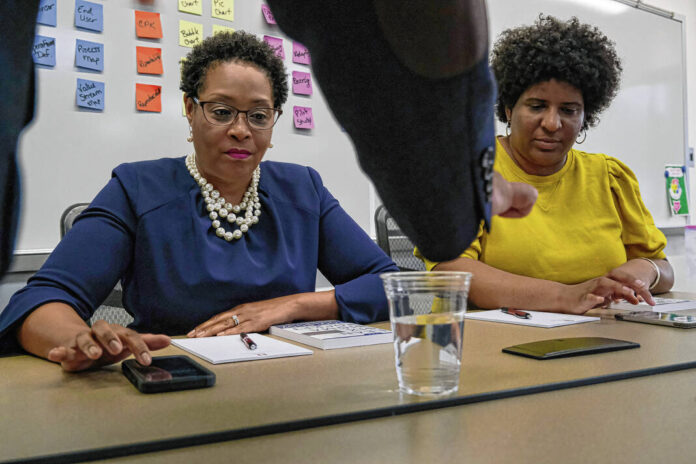
Mike Wolanin | The Republic Detra Warren, left, and Sydney Rucker demonstrate a data analysis exercise they perform for their Six Sigma Green Belt certification at IUPUC in Columbus, Ind., Thursday, July 7, 2022.
IUPUC is partnering with a Marion County initiative to help Black women earn a certification that can be an asset to their careers and the communities where they live.
The university’s Center for Business and Economic Development has partnered with the Six Sigma Racial Equity Institute to help Black women in Indianapolis and Marion County earn their Six Sigma Green Belt certification.
SSREI describes itself as a leadership program created to “upskill Black women to be complex problem solvers.” The institute, which began in 2021, selects a new cohort each year.
One of the program’s goals is to create a talent pipeline of Black women by utilizing Six Sigma Green Belt training. There is also a focus on using this certification to help others. Participants in the program are expected to use their new skillset to respond to inequities that impact the Black community and workforce.
Six Sigma is described as “a methodology used to improve business processes by utilizing statistical analysis.” Different levels of certification are available.
According to IUPUC Assistant Professor of Management and SSREI instructor Jon Padfield — who holds a Lean Six Sigma Master Black Belt — Six Sigma is a “quality improvement tool” that originated from Motorola in the 1980s.
“Basically, it was a way that engineers were trained to gather data to try and figure out what was causing quality problems,” he said. “Over the years, since the 1980s, Six Sigma has worked into other areas such as health care and government services and things like that. What we’re doing with the Six Sigma for Racial Equity Institute is taking the power of data analysis and problem-solving tools that have been used in industry for decades and starting to apply those to some social problems in the Black community.”
SSREI’s second cohort has just completed its first round of training. All of the students have completed the class and passed a certification exam. The group is now working on five different projects, and coaches are checking in on their progress regularly.
“The cornerstone of this initiative is an equity project that impacts the Black community in Marion County,” SSREI states on its website. “Each participant’s project creates a community of stakeholders, funders, participants, and coaches who are benefiting while giving back. Projects focus on education, workforce, and other critical areas.”
Padfield is coaching a team focused on identifying and eliminating challenges that cause Black students in Indiana to complete the Free Application for Federal Student Aid at a lower rate than white students.
Detra Warren, a member of SSREI’s first cohort and project manager with Coldwell Banker Richard Ellis, focused her project on reducing maternal mortality for Black women in Marion County.
“I saw it as an opportunity to reduce deaths that are preventable in Marion County, which is where I’ve lived all my life,” she said.
Unlike Warren’s cohort, SSREI’s second group of participants is the first to be completed in tandem with IUPUC’s Center for Business and Economic Development.
Initially, the institute partnered with Purdue University’s Manufacturing Extension Program to offer the training. Padfield, who teaches at Purdue over the summer, also led training for the 2021 cohort.
“However, there were more constraints going through that university — the way that the material had to be delivered and the type of material,” he said. “It was very manufacturing-focused because that’s what the other university was focused on.”
Joy Mason, founder and CEO of SSREI, asked Purdue about changing the material to fit the lens of social issues, but the school wasn’t interested in doing so. Mason sought another partner, and Padfield put her in touch with Melissa Fairbanks, the director of IUPUC’s Center for Business and Economic Development. He was then able to take his own material on Six Sigma and adapt it for SSREI.
Fairbanks said the program’s development included looking at method of delivery and timetable that would suit participants’ needs. She and Padfield collaborated to develop “something that would be efficient, affordable and still meet the requirements of the Six Sigma certification.”
“Many companies, today, will use those tools in a variety of ways,” said Fairbanks. “But the Six Sigma training can be expensive, especially if you don’t work for a large corporation and have those tools accessible that way. So what we’re doing is providing those tools in a way that’s a little more affordable, while we ask sponsors — either individuals or corporations — to sponsor students.”
According to SSREI, these sponsorships significantly reduce the cost of tuition. Participants only pay a small percentage of the training cost, said Padfield.
He also noted that most Six Sigma training programs focus on applying the skillset to either manufacturing or health care.
“I have not seen another Six Sigma program that is really focused on societal issues and particularly focused on projects for the Black community,” he said.
According to SSREI, the certification is also less common among Black women.
“Black women are under-represented in the Six Sigma community because they are commonly under-exposed to this training and its benefits,” the organization states on its website. “…In addition, the Black community is oftentimes the most harmed by inequitable policies, resulting in low education attachment, poor health outcomes, and high unemployment. What if Black people were equipped to solve complex problems for themselves?”
Sydney Rucker, who is in the current cohort and currently works as director of diversity initiatives for the Indiana University School of Medicine, expressed a similar sentiment. She said that the program is important in terms of furthering long-term equity and helping remove obstacles such as systemic racism. She added that the focus on Black women is a “critical element” of the initiative.
“When we look at disproportionate access to education, disproportionate access to healthcare and a number of different arenas, we see that minority women are still facing significant barriers, not only through lack of access to resources, but more so systemic barriers that exist, that we haven’t necessarily addressed from an organizational standpoint,” said Rucker. “So I think that having this particular bold initiative that has a very specific purpose, a very specific focus, with a small cohort design really has long-term benefits.”
There are 12 members in the 2021 cohort and 15 for 2022. SSREI has 10 Black Belt certified coaches, including Padfield.
One of the benefits to small groups, said Rucker, is forming close-knit connections with mentors and other participants.
Fairbanks hopes that an alumni association will form over time, with different cohort members able to network with each other and share information about their community projects.
Additionally, while SSREI’s selection criteria currently states that applicants must live or work in Indianapolis or Marion County, she and Padfield said there are plans to expand.
“Things are not finalized yet, but there’s a good chance that by the time the summer of ‘23 roles around, that it’s going to be more than just Marion County,” said Padfield. “It’s going to be probably multiple sites across Indiana. And then by 2024, it’s probably going to be branching outside of Indiana and getting into other states.”
The growth plan is fluid, as SSREI is still a new organization.
Padfield added that the program is a “phenomenal opportunity” and commended Mason’s idea to use problem-solving tools on social issues.
Warren said that Padfield’s teaching will help her have an impact on others — not just through the community projects she undertakes, but also the example she sets.
“If a young Black student sees me, then they know, ‘Well, if she did it, then I can do it,’” she said. “The very zip codes that are identified as income-poor or food deserts or insecure — I’m a product of that zip code, and I have family members that still live there. And so just because you come from poverty doesn’t mean that you are not capable of taking on a STEM career and graduating from Purdue University, and then taking that degree and impacting your community that you live in. So I think it’s very important to see someone who looks like you, to let you know what’s possible.”




